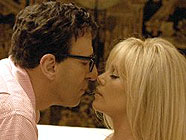|
|
|
|
The
Life and Death of Peter Sellers
|
 |
|
If you can believe this film-portrait of Peter Sellers – and it sticks fairly faithfully to the tenor of most published biographies of the man – he was an actor who could never make peace with the real world. He would tell the most intimate details of the marriage to his second wife, Britt Ekland (Charlize Theron), to his first wife, Anne (Emily Watson). When his career has relaunched with a new Pink Panther movie in the '70s, he used the occasion to publicly maul the reputation of his director, Blake Edwards (John Lithgow). He based career decisions on the advice of a dodgy clairvoyant, Maurice (Stephen Fry). And he insisted on romancing Sophia Loren (Sonia Aquino) even after she had made perfectly clear that she was not interested. Sellers (Geoffrey Rush) was an eternal child, a fantasist, a chameleon. It hardly seems an accident that this biopic appears now, in an era when fact-based stories including Catch Me If You Can (2002) and Shattered Glass (2003) deal with elaborate scams, secret lives and personalities so multiple that any real self seems to disappear beneath the masquerade. The Life and Death of Peter Sellers is an odd spectacle. All biopics have to be ruthlessly selective, but this film's choices about what to include and omit are often baffling. Sellers' work with Stanley Kubrick (Stanley Tucci) is represented by Dr Strangelove (1964) but not Lolita (1962); only a stray gag with toilet paper alludes to the triumph of Edwards' The Party (1968); two of the star's wives are skipped in order to show an ageing Sellers in contemplative solitude at the time of making Being There (1979). A more fundamental problem is the attitude this biopic takes towards its subject. The script by Christopher Markus and Stephen McFeely rushes to provide simplistic psychological explanations of Sellers' behaviour: he had a domineering mother and a weak father, leading to life-long infantilism and a severe Oedipus complex. Yet the film fudges even this banal character analysis by recourse to the hoariest cliché common to all modern, jazzy biopics in the shadow of Orson Welles' Citizen Kane (1941): namely, that such gifted individuals are ultimately inscrutable and unknowable. If that is truly the case, why then bother making a biopic? The Life and Death of Peter Sellers evades this killer question by taking another currently popular option: presenting a 'self' as the sum of its wildly diverse masks and performances. The Andy Kaufman biopic Man on the Moon (1999) made this case far more convincingly. Here, in director Stephen Hopkins' nod to the garish style pioneered by Bob Fosse in All That Jazz (1979), the notion of a life as a perpetual performance (or one big circus) provides the pretext for studiously surreal fantasy sequences, drug-induced hallucinations and pointless passages where the film breaks its illusion and presents Rush in the garb of all the major characters, be they young or old, male or female. Everything in this story comes heavily filtered through pop-culture notions of what the 1960s and '70s, with its explosion of affluence and decadence, looked and felt like. In this, Hopkins's film frequently resembles another cautionary tale of celebrity gone mad, Paul Schrader's Bob Crane biopic Auto Focus (2002). But one quickly wearies of the emblematic procession of classic songs, hemlines and hairdos. The Life and Death of Peter Sellers provides a virtuoso vehicle for Geoffrey Rush, who does not fail to impress – although he is surely in danger of basing his entire career on eccentric, oddball stylisations. Rush's acting is technically brilliant, but the conception of his role comes wrapped inside a frustrating conceit: since we cannot know the 'real' Sellers, Rush renders even the star's most intimate moments via careful mimicry of something he did on-screen. On this as on every level, the movie becomes a facile hall of mirrors: it uses the most stereotypical and artificial means in order to describe (and even denounce) a man 'without soul'. There are, nevertheless, some striking scenes in the film, such as the powerful moment, largely told visually, when Sellers takes revenge on his son for inadvertently damaging his new status-symbol car; or the uncomfortable episode when Britt announces her pregnancy to a nonplussed Sellers sitting on the toilet. MORE showbiz biopics: De-Lovely, Gods and Monsters MORE biopics: Ali, The Aviator, Basquiat, Heart Like a Wheel, I Shot Andy Warhol, Kundun, Malcolm X, Nixon, The People vs. Larry Flynt, Pollock, What's Love Got to Do With It? MORE Hopkins: The Ghost and The Darkness, Lost in Space, Judgment Night © Adrian Martin August 2004 |
![]()